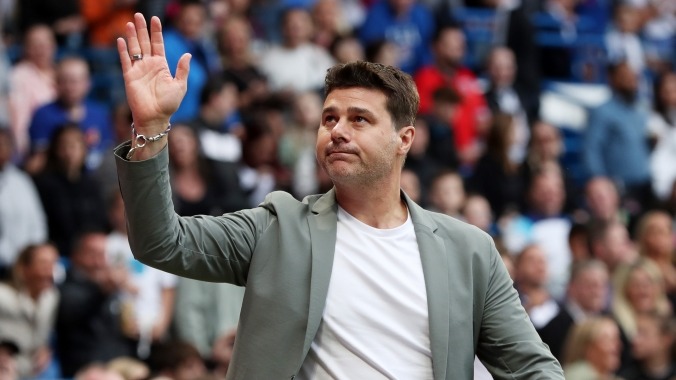Mauricio Pochettino Is the Kamala Harris of the U.S. Men’s National Soccer Team
Photo by Henry Browne/Getty Images
Let’s say there’s a leader who’s done decently well in his first term, but in preparations for a second, there’s a growing sense among the people that he’s not quite the right person for the job. And yet, inertia has set in and a replacement seems unlikely, so the people are bracing for a disaster to come. But suddenly, following a cataclysmic failure on a big stage, that leader moves aside — making way for a new leader that provides a new sense of hope and optimism.
That’s right, this is the story of the U.S. men’s national soccer team. A little more than a month ago, Gregg Berhalter was dismissed from his post as head coach following his team’s early exit from the 2024 Copa America. That tournament was supposed to be a telling tune-up en route to the 2026 World Cup, and it was telling enough that U.S. Soccer decided to not let him coach a second full World Cup cycle.
Though it’s not quite official yet — dependent on U.S. Soccer coordinating a settlement with Premier League club Chelsea, which has had no trouble spending money in recent years — reports have been rampant over the last few days that Mauricio Pochettino will be helming the club.
For a team that looked like it was heading toward a desultory and even disconsolate lead-up to the 2026 World Cup it’s hosting, this would be an abrupt about-face: it now could be getting arguably the best and most qualified coach it’s ever had.
It’s also a curious choice in that it’s an Argentine coach. The U.S.’s last non-American head coach was Jürgen Klinsmann, who controversially led the team during its 2014 World Cup cycle and was fired halfway through the 2018 cycle.
The best World Cup run the U.S. has ever had, save for a third-place finish in the inaugural 1930 event, came under American coach Bruce Arena, who got the 2002 team to the quarterfinals (and perhaps one bad “missed” handball call from reaching the semis). Arena oversaw the team through two World Cup cycles (including a less-than-stellar 2006) and then was called to succeed Klinsmann in what was ultimately a failed bid to get to the World Cup in 2018.
While the 52-year-old Pochettino has never helmed a national team, he has had a solid run as a club manager, first with Espanyol, then leading Southampton to a better-than-expected ‘13-’14 season, which he then parlayed into a five-year run with Tottenham Hotspur. Though that ended with an abrupt firing in 2019 (where he was succeeded by Jose Mourinho), he next landed at Paris Saint-Germain, where he got to lead a dream team of Lionel Messi, Neymar, Kylian Mbappé, and Angel di Maria.
That lasted just a year, as he won the league but fell short in the Champions League tournament that his dream team was built for. He then moved to Chelsea in 2023, coaching there for a season. While that also didn’t go as hoped for, that had more to do with the hodgepodge of players Chelsea had assembled and their difficulties against more cohesive groups throughout the Premier League.
With the U.S., Pochettino will get to take his philosophy, his preferred style of play, and his desire to have his players run — and implement it with a talented group of players at a variety of points in their club careers.
Pochettino’s style of play isn’t so far from Berhalter’s, but it’s not quite as possession-obsessed, and it’s arguably pragmatic enough to institute in the limited amount of time coaches get with their national team squads. If they all get it right, working together, it will not only be redemptive for a concerningly underachieving group of players shouldering the considerable weight of a “golden generation” tag, but also for a manager who has lacked for the luck that his acumen should bring.
To be clear, the U.S. is a good but not elite soccer team on its best days. It was last in FIFA’s top ten in the world rankings in 2021, and is currently 16th. Winning the World Cup, even with home field advantage in 2026, seems unlikely against the likes of France, Argentina, and Brazil. But with Pochettino leading, a semifinal appearance is more likely now than it was with Berhalter helming the team.
And while that wouldn’t be a victory in the traditional sense, it would perhaps say more about Pochettino and his abilities than anything he’s done to date.
For now, he’s bringing a renewed sense of optimism that wouldn’t have existed should a freshly-defeated Berhalter be presiding over a team that ultimately failed its most crucial pre-World Cup test. For U.S. soccer fans, already reveling in the women’s team winning a World Cup, it’s now an even better summer than they thought possible after the men’s inauspicious beginnings.